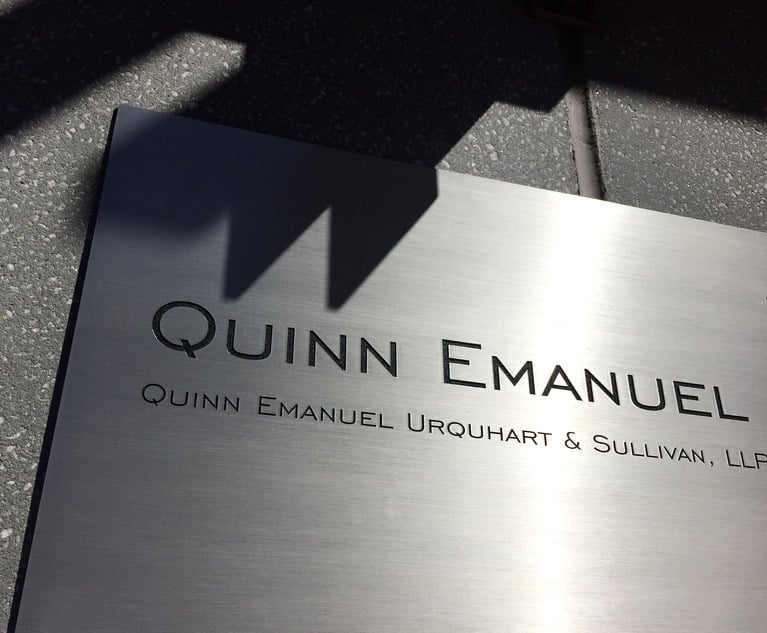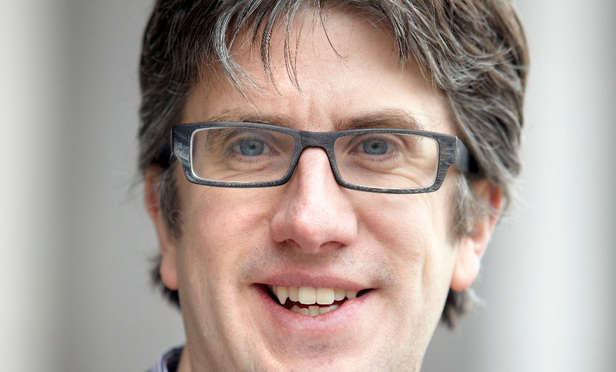'You've got to keep moving' – Top 20 Legal IT Innovators 2016: LOD co-founder Simon Harper
Legal Week Intelligence, in association with Fulcrum GT, recently published the first edition of its Top 20 Legal IT Innovators report, which profiles…
November 23, 2016 at 04:20 AM
6 minute read
Legal Week Intelligence, in association with Fulcrum GT, recently published the first edition of its Top 20 Legal IT Innovators report, which profiles the law firm leaders, in-house lawyers and tech pioneers driving change in the legal profession.
Click here to download the report from Legal Week Law (free registration required).
"Lawyers are not great at things going wrong or in dealing with uncertainty. Innovation requires an ability to deal with both," says Simon Harper, co-founder of Lawyers On Demand (LOD).
Started in 2007, LOD was Harper's brainchild (together with Jonathan Brenner) after eight years as a partner leading the technology and media team at Berwin Leighton Paisner (BLP). Ever since, LOD has been at the forefront of alternative legal service providers, creating a new category of business.
In 2012, Harper stepped down from the BLP partnership to spin out LOD and lead the business full time. Since the spinoff, lawyer headcount has trebled. Today, it has around 650 freelance lawyers working with clients operating in the UK and – via its recent merger with AdventBalance – in Australia, Hong Kong and Singapore.
At the outset, Harper points to a combination of three things happening simultaneously as catalysts. First, he highlights: "An awareness that our large corporate clients were looking for a different way of doing some of their work, their business as usual work, which just didn't make sense for them at £300-£500 per hour."
The second piece was "more of a hunch", he says. "People who didn't want the traditional route, had got a fantastic CV but just wanted to work differently. It was something bigger than work-life balance, a shift in attitude about what people really wanted from their working life. The hunch was: this wasn't just a small group of individuals but a wider group that would be happy to work that way."
The third element centred on how people work, the role of technology, globalisation and the shifting expectations of the employer-employee relationship. "Perhaps an openmindedness to how people work, fuelled by different technology," says Harper.
In combining three pieces of the puzzle, "the glue", he adds, came with LOD creating "a different sort of legal service". LOD was in gestation for a year, launching before the crisis of 2008-09. "The latent need in the market was then accelerated," says Harper, who had to persuade others to back him: "Lawyers can do risk but there is an unwillingness to deal with uncertainty."
He explains that there are two sides to the LOD equation that make it work. "There is the client side and the lawyer side – because with that offering, the lawyers who work with LOD have as much power as the clients do: they can choose where they work, when they work, how they work and who they want to work with."
Harper wanted to "banish the false perception of lawyers who choose to work on a project or interim basis as being second rate". But arguably his greatest challenge came from starting LOD within an existing law firm, although he points to "a hugely helpful approach from BLP". Leveraging the BLP brand was "useful", but he found that LOD very quickly "built up trust".
In the way that someone might use Airbnb, we felt people increasingly wanted to find out more information about the sorts of lawyers they could work with in a flexible way.
In presenting the LOD brand, he worked hard to differentiate. He says: "Even how the website or material looked, we always used the mantra: what wouldn't a law firm do?" The key issue in brand differentiation, he explains, was to retain the quality. "That was about the lawyers we hired and the people we hired to run the business – to make sure that whatever we did was shot through with quality."
As LOD's success became clear, imitators emerged: "A really useful reminder that innovation isn't static," he says. "In a changing market you've got to keep moving. We've got to keep making sure that what we offer lawyers is the best available, the most relevant and that we're providing what they want."
After the 2012 spinoff, LOD started an "on-call service", slightly closer to what law firms provide, so more of a challenge to the traditional law firm model where clients can use the LOD lawyers flexibly on projects. LOD now works with more than 20 law firms, most recently DLA Piper.
This year has seen further innovation at LOD. Internationally, the Australian merger in March with AdventBalance was followed by the launch of Spoke in July. An online marketplace for legal services, Spoke allows businesses or law firms seeking short-term extra help to hire lawyers with spare capacity.
"In the way that someone might use Airbnb," says Harper, "we felt people increasingly wanted to find out more information about the sorts of lawyers they could work with in a flexible way – that is what Spoke is about. There is a wider group of lawyers that want to work in this way. For example, there are quite a few barristers on there."
Being an innovator often means being a disruptor. "It's something we enjoy doing as an organisation and something I enjoy doing to make things work," says Harper. "I think it's important to be enjoying it and feeling like it's making a bit of a difference and also to feel that there's some fun in it too." Although he acknowledges that big law firms have also innovated, he adds: "Notably, none of them have created their captive, LOD-like businesses as separate entities. None of them spun them out – they sit as captives within the traditional firm."
Harper reflects on how far LOD has come in a decade. "One of the really useful elements of having built a business like LOD is its agile size and structure," he says. "What strikes me about its management structure is that we can react fairly nimbly to market changes as we see them. We don't have a partnership that we need to bring along."
An avid fan of technology, who loves innovation, he reads widely on the subject: "I am completely with AI and anyone who ignores it does so at their peril, but it's not as if the machines will take over."
This content has been archived. It is available through our partners, LexisNexis® and Bloomberg Law.
To view this content, please continue to their sites.
Not a Lexis Subscriber?
Subscribe Now
Not a Bloomberg Law Subscriber?
Subscribe Now
NOT FOR REPRINT
© 2025 ALM Global, LLC, All Rights Reserved. Request academic re-use from www.copyright.com. All other uses, submit a request to [email protected]. For more information visit Asset & Logo Licensing.
You Might Like
View All
X Ordered to Release Data by German Court Amid Election Interference Concerns

Compliance With the EU's AI Act Lags Behind as First Provisions Take Effect

Quinn Emanuel's Hamburg Managing Partner and Four-Lawyer Team Jump to Willkie Farr

Trump ICC Sanctions Condemned as ‘Brazen Attack’ on International Law
Trending Stories
- 1ACC CLO Survey Waves Warning Flags for Boards
- 2States Accuse Trump of Thwarting Court's Funding Restoration Order
- 3Microsoft Becomes Latest Tech Company to Face Claims of Stealing Marketing Commissions From Influencers
- 4Coral Gables Attorney Busted for Stalking Lawyer
- 5Trump's DOJ Delays Releasing Jan. 6 FBI Agents List Under Consent Order
Who Got The Work
J. Brugh Lower of Gibbons has entered an appearance for industrial equipment supplier Devco Corporation in a pending trademark infringement lawsuit. The suit, accusing the defendant of selling knock-off Graco products, was filed Dec. 18 in New Jersey District Court by Rivkin Radler on behalf of Graco Inc. and Graco Minnesota. The case, assigned to U.S. District Judge Zahid N. Quraishi, is 3:24-cv-11294, Graco Inc. et al v. Devco Corporation.
Who Got The Work
Rebecca Maller-Stein and Kent A. Yalowitz of Arnold & Porter Kaye Scholer have entered their appearances for Hanaco Venture Capital and its executives, Lior Prosor and David Frankel, in a pending securities lawsuit. The action, filed on Dec. 24 in New York Southern District Court by Zell, Aron & Co. on behalf of Goldeneye Advisors, accuses the defendants of negligently and fraudulently managing the plaintiff's $1 million investment. The case, assigned to U.S. District Judge Vernon S. Broderick, is 1:24-cv-09918, Goldeneye Advisors, LLC v. Hanaco Venture Capital, Ltd. et al.
Who Got The Work
Attorneys from A&O Shearman has stepped in as defense counsel for Toronto-Dominion Bank and other defendants in a pending securities class action. The suit, filed Dec. 11 in New York Southern District Court by Bleichmar Fonti & Auld, accuses the defendants of concealing the bank's 'pervasive' deficiencies in regards to its compliance with the Bank Secrecy Act and the quality of its anti-money laundering controls. The case, assigned to U.S. District Judge Arun Subramanian, is 1:24-cv-09445, Gonzalez v. The Toronto-Dominion Bank et al.
Who Got The Work
Crown Castle International, a Pennsylvania company providing shared communications infrastructure, has turned to Luke D. Wolf of Gordon Rees Scully Mansukhani to fend off a pending breach-of-contract lawsuit. The court action, filed Nov. 25 in Michigan Eastern District Court by Hooper Hathaway PC on behalf of The Town Residences LLC, accuses Crown Castle of failing to transfer approximately $30,000 in utility payments from T-Mobile in breach of a roof-top lease and assignment agreement. The case, assigned to U.S. District Judge Susan K. Declercq, is 2:24-cv-13131, The Town Residences LLC v. T-Mobile US, Inc. et al.
Who Got The Work
Wilfred P. Coronato and Daniel M. Schwartz of McCarter & English have stepped in as defense counsel to Electrolux Home Products Inc. in a pending product liability lawsuit. The court action, filed Nov. 26 in New York Eastern District Court by Poulos Lopiccolo PC and Nagel Rice LLP on behalf of David Stern, alleges that the defendant's refrigerators’ drawers and shelving repeatedly break and fall apart within months after purchase. The case, assigned to U.S. District Judge Joan M. Azrack, is 2:24-cv-08204, Stern v. Electrolux Home Products, Inc.
Featured Firms
Law Offices of Gary Martin Hays & Associates, P.C.
(470) 294-1674
Law Offices of Mark E. Salomone
(857) 444-6468
Smith & Hassler
(713) 739-1250









